Share
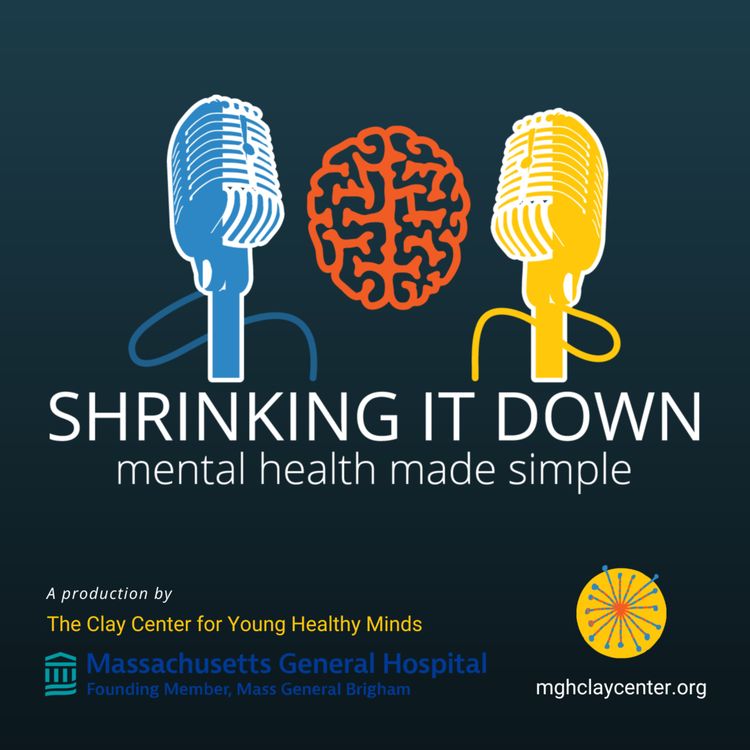
Shrinking It Down: Mental Health Made Simple
Cannabis and the Teen Brain, featuring Jodi Gilman, Ph.D.
Welcome to today’s “pot-cast”! Marijuana is on everyone’s mind, especially the parents of tweens and teens, as it becomes legal in more states – not just for medicinal use, but for recreation. We’ve learned from alcohol that teens are going to have easier access to cannabis the more state laws ease up, even when the age minimum is 21. But pot today and pot in the 70s are almost like two different drugs. And the truth is, we don’t know all the ways that it affects teen development because it hasn’t been studied for that long.
So, what do we know about weed and its effects on the teen brain? Gene and Steve welcome special guest Jodi Gilman, PhD, a neuroscientist at The Center for Addiction Medicine at Mass General Hospital, to discuss. Her research focuses on the effects of alcohol and cannabis on the brains of adolescents and young adults – be sure to check out her most recent study at the top of today's media list.
Media List
- One Month of Cannabis Abstinence in Adolescents is Associated With Improved Memory (Journal of Clinical Psychiatry)
- When Adolescents Give Up Pot, Their Cognition Quickly Improves (NPR)
- Marijuana and the Young Brain (VIDEO – MGH Advances in Motion)
- Wondering What the Law Is Your State? (DISA Global Solutions)
- Teen and Parent Misconceptions About Driving and Marijuana (MGH Clay Center)
- Q+A: Once You’ve Discovered Your Teen is Using Pot, What’s the Next Step? (MGH Clay Center)
- April 20 is Upon Us: Making Sense of Marijuana (MGH Clay Center)
- Ray Charles – Georgia on My Mind (YouTube)
Episode edited by Sara Rattigan
Music by Gene Beresin
More episodes
View all episodes
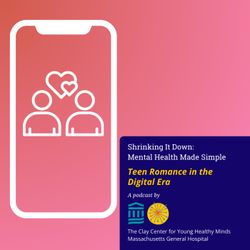
6. Teen Romance in the Digital Era
37:47||Season 9, Ep. 6In this Valetine's Day special of Shrinking it Down, Gene and Khadijah explore how teen romance is being reshaped in the digital age. From texting and social media to AI chatbots, they unpack the ways technology is transforming how teens connect, communicate, and even break up. While some online spaces can create a sense of closeness and constant connection, they also bring new challenges such as comparison culture, ghosting, and difficulty navigating face-to-face relationships. Tune in for practical guidance on the importance of modeling healthy relationships, staying informed about their children's digital worlds, and when to worry about a breakup. Media ListExploring the World of AI Therapy (MGH Clay Center)How Teens Incorporate Online Platforms and Digital Devices Into Their Romantic Relationships (Pew Research Center)Hit Send, No Wait: The Dangers Of A Hyper-Personal Online Life (MGH Clay Center)Social Media & Body Image (Shrinking it Down)Teens, Technology and Romantic Relationship (Pew Research Center)The Power of Peer Support (Shrinking it Down)Conflict Resolution Course (MGH Clay Center)Ways to Help Your Lonely Teenager (MGH Clay Center)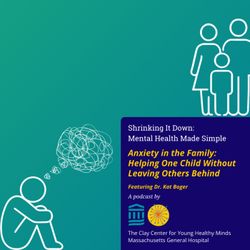
5. Anxiety in the Family: Helping One Child Without Leaving Others Behind
42:26||Season 9, Ep. 5In this special episode of Shrinking it Down: Mental Health Made Simple, Gene and Khadijah explore how parents can talk openly with children about a sibling’s anxiety. Joined by co-founder of InStride Health, Dr. Kat Boger, they discuss age-appropriate explanations, reducing stigma, supporting siblings’ emotional needs, and avoiding unhelpful family accommodations. They offer practical, compassionate guidance for helping the whole family build resilience together. Tune in for important and practical advice on supporting your child with anxiety!Media ListAbout (InStride Health)Anxiety Disorders (MGH Clay Center)Talking to Kids About a Sibling's Mental Illness (MGH Clay Center)Growing Up With a Sibling With a Disability (MGH Clay Center)No Kings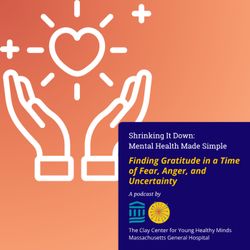
4. Finding Gratitude in a Time of Fear, Anger, and Uncertainty
24:48||Season 9, Ep. 4Thanksgiving is approaching fast; a time of gratitude, reflection, and gathering. But this year feels different. With fear, anger, and uncertainty dominating our world, it’s hard to ask: How are we supposed to give thanks right now? In this holiday episode of Shrinking it Down: Mental Health Made Simple, Gene and Khadijah discuss the importance of staying grateful when the world feels chaotic. They talk about the benefits of gratitude on well-being and resilience and the importance of community, learning from the past, and respecting different viewpoints. Tune in for strategies to help your family build gratitude this holiday season through open conversations, stories, and creative expression! Media ListIlluminated Collage (MGH Clay Center)Conflict Resolution Course (MGH Clay Center) The Art of Civil Conversations: 9 Parent Strategies (MGH Clay Center)Five Parenting Tips for Civility and Coping With the Political Climate (MGH Clay Center)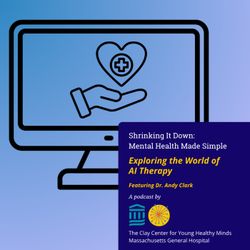
3. Exploring the World of AI Therapy
39:54||Season 9, Ep. 3Artificial intelligence (AI) is slowly becoming a major part of our society. Everday more and more people begin to rely on AI for a variety of tasks in their daily routines. While most people use AI for innocuous reasons such as answering basic questions like a search engine would, today we’re here to discuss one of the more harmful uses of AI: AI therapy chatbots aimed at our youths. In this episode of Shrinking it Down: Mental Health Made Simple, Gene and Khadijah are joined by forensic psychiatrist Dr. Andy Clark to discuss the growing role of AI chatbots in mental health support. From lacking empathy and clinical judgement to dangerously endorsing harmful behaviors, we explore the promises and pitfalls of AI Therapy for our young people. Tune in to learn more!Media List:Andrew Clark, M.D.The Risks of Kids Getting AI Therapy from a Chatbot (TIME)Adventures in AI Therapy: A Child Psychiatrist Goes Undercover (MGH Clay Center)The Ability of AI Therapy Bots to Set Limits With Distressed Adolescents: Simulation-Based Comparison Study (PubMed)Harry Harlow Monkey Experiments (Simply Psychology)Illinois Bans AI Therapy (National Law Review)The Rithm Project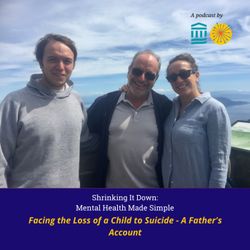
2. Facing the Loss of a Child to Suicide - A Father's Account
51:41||Season 9, Ep. 2Today is World Suicide Prevention Day: a time to bring global attention to the urgent public health crisis of suicide and to reaffirm our collective commitment to prevention through compassion, connection, and community.In this special episode of Shrinking it Down: Mental Health Made Simple, Gene and Khadijah are joined by Dr. Tony Rostain for a deeply moving conversation about love, loss and healing. Dr. Rostain shares the story of the tragic loss of his son, Julian to suicide - a bright, talented young man who battled anxiety and depression, which were greatly intensified by the isolation he experienced during the COVID-19 pandemic. Through his story, Dr. Rostain helps Gene and Khadijah explore the healing power of community, love and remembrance while also reflecting on what helped him process the grief and continue his work in mental health.Media ListWorld Suicide Prevention Day 2025 (World Health Organization)Anthony L. Rostain, MD, MA (Cooper University)Sara Rian BooksJulian Memorial – Remembering Julian RostainPack Up Your Sorrows - Richard & Mimi Farina (YouTube)I Love You Dad: Words A Father Will Never Hear Again (MGH Clay Center)Loving the Gone (Amazon)Home | AFSP (American Foundation for Suicide Prevention)The Jed Foundation (JED)Resources for People who Think About Suicide (National Institute on Mental Illness)Preventing Suicide (CDC)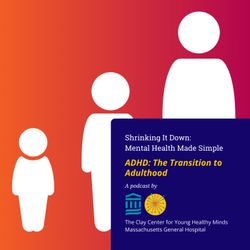
1. ADHD: The Transition to Adulthood
54:00||Season 9, Ep. 1Welcome back to a new season of Shrinking it Down: Mental Health Made Simple!For our back-to-school season opener, we are joined by Dr. Tony Rostain for a deep dive on how ADHD changes from teen to adulthood. They break down the importance of early intervention, the benefits of school accommodations, and why anxiety and other co-occurring conditions can be common in children and teens with ADHD. If you want to understand ADHD better and hear what actually helps, this episode’s for you.Media ListAnthony L. Rostain, MD, MA (Cooper University)The Adult ADHD Tool Kit (Taylor Francis)CHADD - Children and Adults with Attention Deficit DisorderADDA - Attention Deficit Disorder AssociationMake America Healthy Again (MAHA) (Department of Health and Human Services)Including Disability and Belonging in Diversity, Equity and Inclusion (MGH Clay Center)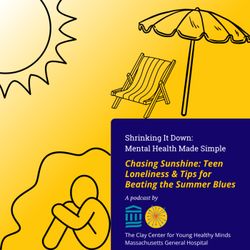
9. Chasing Sunshine: Teen Loneliness & Tips for Beating the Summer Blues
33:39||Season 8, Ep. 9While the summer is usually painted as time of fun, freedom, and relaxation, for many teens it can feel like the exact opposite — disconnected, isolating, and emotionally heavy. Without the daily structure of school or regular peer interaction, teens can find themselves feeling invisible, left out, or unsure of where they belong. In the season 8 finale, Gene and Khadijah dive into the impact summer can have on teen loneliness. Tune in for practical tips for parents on how to help their teens stay connected, the power of self-care and creative expression, and ways to keep your teen busy this summer!We wish you a connected and relaxing summer! We’ll see you back here in August to discuss the transition from childhood to adult ADHD with special guest Tony Rostain, MD, MA.Media ListSummertime: Making The Livin’ Easy With Kids (MGH Clay Center)Over-Scheduled, Stressed-Out Families (MGH Clay Center)11 Self-Care Tips for Teens and Young Adults (MGH Clay Center)Homepage (4-H)Why Activism Is Good For Teens — And The Country (MGH Clay Center)The Vital Role and Methods of Mental Health Advocacy (Shrinking it Down)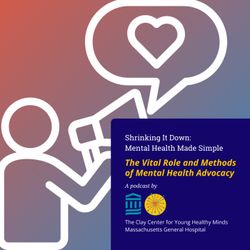
8. The Vital Role and Methods of Mental Health Advocacy
31:56||Season 8, Ep. 8Why are our young people struggling so much? In this special episode for Mental Health Awareness Month, Gene and Khadijah dive into the growing youth mental health epidemic. They explore the sharp rise in anxiety, depression, and other mental health challenges among children and teens since the 1980s—fueled by factors like social media, shifting family dynamics, economic inequality, and systemic discrimination. With only about 11,400 child and adolescent psychiatrists in the U.S. for the 14–20 million young people who need care, the workforce shortage is dire. Gene and Khadijah call for urgent advocacy—encouraging listeners to support change through actions like contacting lawmakers, engaging with local communities, joining peer support efforts, and promoting mental health education. Tune in for a candid, compassionate conversation about how we can all help make mental health care more accessible and equitable for our youth.Media ListAddressing the Youth Mental Health Epidemic (Springer)Severe Shortage of Child and Adolescent Psychiatrists (AACAP)Varying Estimates of Social Workers in the United States: Which Data Source to Use? (NIH)Ways to Help Your Lonely Teen Online Course (MGH Clay Center)Conflict Resolution Course (MGH Clay Center)Active Minds The Power of Peer Support (Shrinking it Down)Why Activism Is Good For Teens — And The Country (MGH Clay Center)If It's Okay To Not Be Okay (See Me Scotland)What’s Up With Everyone? A Youth Mental Health Campaign With Academy-Award Winning Aardman (MGH Clay Center)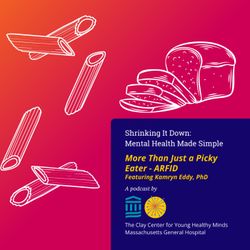
7. More Than Just a Picky Eater - ARFID
44:59||Season 8, Ep. 7Almost everyone knows a picky eater, either from their own childhood or from their child's experiences. But sometimes picky eating goes beyond a simple preference for plain pasta. In this episode of Shrinking it Down: Mental Health Made Simple, Gene and Khadijah sit down with Dr. Kamryn Eddy to unpack the complexities of ARFID —Avoidant/Restrictive Food Intake Disorder. More than just picky eating, ARFID can significantly impact a person's physical health and social life, leading to growth issues, nutritional deficiencies, and emotional struggles. Tune in to hear more about ARFID, its treatments, and its promising recovery outcomes. Media ListKamryn Eddy, Ph.D. (MGH)ARFID (DSM-5)ARFID (National Eating Disorders Association)Eating Disorders Screening Tool (National Eating Disorders Assocation)